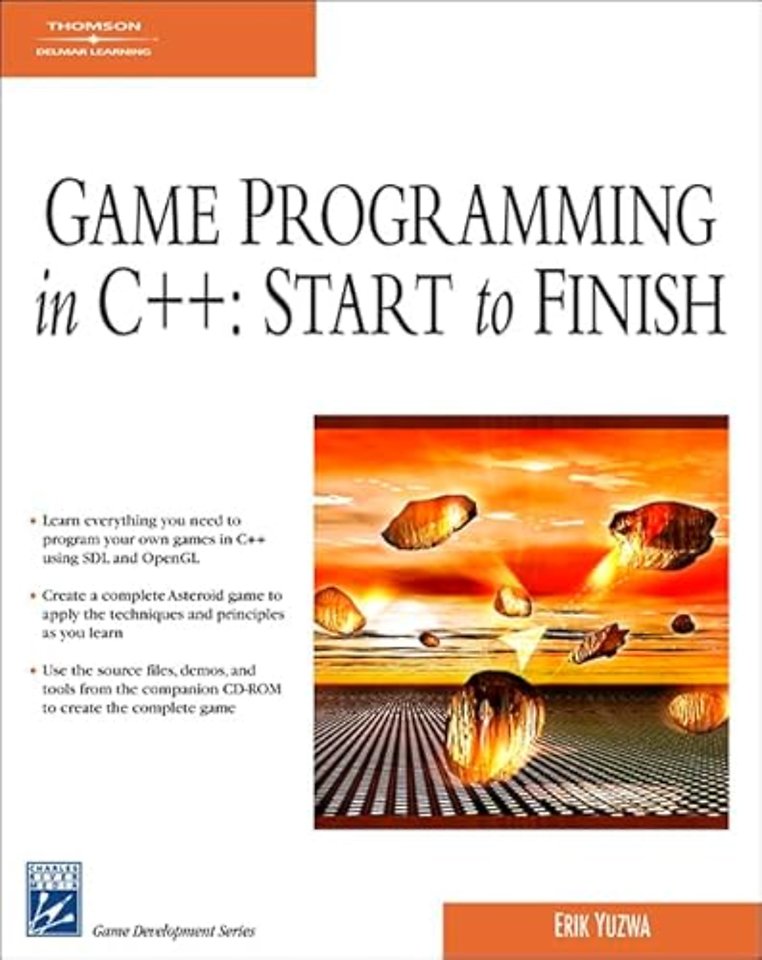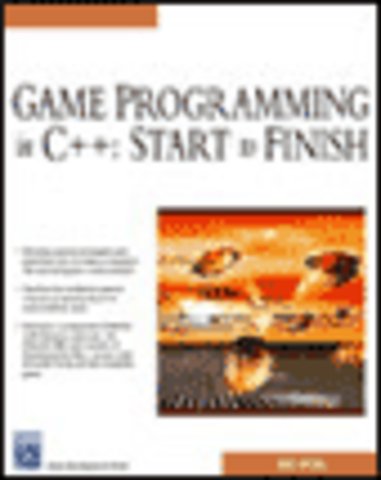


Erik Yuzwa (Calgary, AB) has been a professional computer programmer for over seven years since he graduated from University of Calgary in 1998 with a Bachelor of Science in Computer Science.
Meer over Erik YuzwaGame Programming in C++: Start to Finish
Samenvatting
Welcome to the exciting world of game programming! If you're already familiar with the C++ programming language and want to learn how to program games, this book is for you. 'Game Programming in C++: Start to Finish' will help you learn how to turn your own game fantasies into playable realities!
Over the course of the book, you'll learn the popular techniques and practices behind today's games. Not only will you add a lot of theory to your game programming toolkit, but you'll also create a small basic game from scratch SuperAsteriodArena. While you'll focus on using the SDL and the OpenGL libraries to learn game programming, you'll also learn the essential Windows principles that you'll need to create just about any kind of game with any other API such as DirectX.
This easy-to-follow book takes current game programming information and filters it down to a practical level. Each chapter and subsection builds upon previous chapters and topics in a tutorial format, allowing you to progress at your own pace. As you work through the book, you'll build the SuperAsteriodArena game, beginning with engine creation and 3D programming with SDL and OpenGL. >From there you'll move on to animation effects, audio, collision detection, networking, and finalizing the game. A variety of tools are used throughout, including Visual Studio and OpenGL, SDL, Autodesk 3ds Max, and the Audacity sound tool.
Key features:
- Teaches C++ game programming in an easy-to-follow style
- Uses the creation of a complete game - SuperAsteriodArena- to teach the entire game development process from concept and design document to finalizing the game
- Explains important Windows programming techniques that can apply to any project
- Uses a variety of popular tools - Visual Studio, SDL, OpenGL, CVS, gDEBugger, Autodesk 3ds Max, and the Audacity sound tool Includes a CD-ROM with libraries and tools, including the SDL libraries, trial versions of Audacity, 3ds Max 7, gDEBugger, InnoSetup, CVSNT, doxygen, the source code from the book, and the complete game from the book
On the cd:
- Demos: gDEBugger (Graphic Remedy) - Tools for finding and isolating problems with OpenGL commands; MoleBox Pro (MoleBox) - Utility for compressing game assets; Autodesk 3ds Max 7 demo
- Tools: SDL (Simple DirectMedia Layer); CEGUI (Crazy Eddie's GUI System); Lua (The Lua Interpreter); OpenAL (The Open Audio Library); PreplicaNet; Tokaak (The Tokamak Physics Library); Audacity; BitmapFontBuilder; CVSNT; Doxygen; InnoSetup
- Game Files and Source code
Specificaties
Inhoudsopgave
Preface
1. Game Technologies
2. Design Fundamentals
3. Introduction to SDL and Windows
4. Introduction to the Peon Engine
5. Graphics Programming Mathematics
6. Creating an OpenGL Renderer
7. More OpenGL Techniques
8. Scene Geometry Management
9. Graphics Timebox
10. Working with Input Devices
11. Working With Sound
12. Input and Sound Timebox
13. Collision Detection and Physics Techniques
14. Introduction to Networking
15. Networking Timebox
16. Introduction to Models
17. Animation and Special Effects
18. Introduction to the OpenGL Shading Language (GLSL)
19. Introduction to Scripting
20. Polish Timebox
21. Finishing Tips and Tricks
Appendix A: Setting Up the SDL and the Compiler
Appendix B: Debugging Tools
Appendix C: ASCII Table
Appendix D: Windows Vista and OpenGL
Appendix E: About the CD-ROM
Appendix F: Further Resources
Anderen die dit boek kochten, kochten ook
Net verschenen
Rubrieken
- aanbestedingsrecht
- aansprakelijkheids- en verzekeringsrecht
- accountancy
- algemeen juridisch
- arbeidsrecht
- bank- en effectenrecht
- bestuursrecht
- bouwrecht
- burgerlijk recht en procesrecht
- europees-internationaal recht
- fiscaal recht
- gezondheidsrecht
- insolventierecht
- intellectuele eigendom en ict-recht
- management
- mens en maatschappij
- milieu- en omgevingsrecht
- notarieel recht
- ondernemingsrecht
- pensioenrecht
- personen- en familierecht
- sociale zekerheidsrecht
- staatsrecht
- strafrecht en criminologie
- vastgoed- en huurrecht
- vreemdelingenrecht





